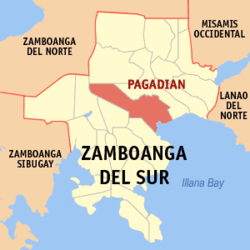Pagadian City
| Pagadian | ||
|---|---|---|
| Component City | ||
| City of Pagadian | ||

F.S. Pajares Ave. in Pagadian City, showing the view of Illana Bay in the background
|
||
|
||
| Nickname(s): Little Hongkong of the South; | ||
| Motto: Asenso Pagadian! | ||
 Map of Zamboanga del Sur with Pagadian highlighted |
||
| Location within the Philippines | ||
| Coordinates: 7°50′N 123°26′E / 7.83°N 123.43°ECoordinates: 7°50′N 123°26′E / 7.83°N 123.43°E | ||
| Country | Philippines | |
| Region | Zamboanga Peninsula (Region IX) | |
| Province | Zamboanga del Sur | |
| District | 1st district of Zamboanga del Sur | |
| Chartered | March 23, 1937 | |
| Cityhood | June 21, 1969 | |
| Barangays | 54 | |
| Government | ||
| • Mayor | Romeo Pulmones (LP) | |
| • Vice Mayor | Ernesto Mondarte (LP) | |
| Area | ||
| • Total | 378.8 km2 (146.3 sq mi) | |
| Elevation | 100 m (300 ft) | |
| Highest elevation (Mount Palpalan) | 208 m (682 ft) | |
| Population (2015 census) | ||
| • Total | 199,060 | |
| • Density | 530/km2 (1,400/sq mi) | |
| Demonym(s) | Pagadianon | |
| Time zone | PST (UTC+8) | |
| ZIP code | 7016 | |
| Dialing code | +63 (0)62 | |
| Income class | 2nd city income class | |
| 097322000 | ||
| Electorate | 110,857 voters as of 2016 | |
| Language(s) | Cebuano, Filipino, English, Hiligaynon, Subanen, Ilokano, Iranun, Maguindanao, Tausug, Samal, Chavacano | |
| Ecclesiastical Province | Archdiocese of Ozamiz | |
| Episcopal polity | Diocese of Pagadian | |
| Patron Saint | Sto. Niño de Cebu | |
| Website | www |
|
Pagadian, officially the City of Pagadian (Filipino: Lungsod ng Pagadian; Cebuano: Dakbayan sa Pagadian; Chavacano/Spanish: Ciudad de Pagadian), is located in Western Mindanao region, in the Philippines. It is the capital of the province of Zamboanga del Sur and the regional center of Zamboanga Peninsula. Pagadian City is the second largest city in the region, after the independent city of Zamboanga. According to the 2015 census, it has a population of 199,060 people.
With its beginnings as a stop-over for traders who ply the road between the old Spanish fort-town of Zamboanga on the southwestern tip of the Zamboanga peninsula and other bigger towns to the north of the old Zamboanga Province and apart from its sheltered bay and good fishing grounds, it was not a place where anyone imagined that a city would be founded on it as it is situated on steeply rolling terrain. In the course of its local history, waves of different kinds of people came to stay and eventually called among themselves "Pagadianons."
The iconic symbol of Pagadian is its uniquely designed tricycle built to adopt to the city's hilly terrain. It is the only place in the Philippines with a public transport inclined at about 25-40° angle.
Pagadian is on the northeastern side of the Western Mindanao region, bordering on Illana Bay. It is bounded by the municipalities of Tigbao and Dumalinao on the southwest, Lakewood on the west, Labangan on the east and northwest, and Midsalip on the north.
...
Wikipedia


